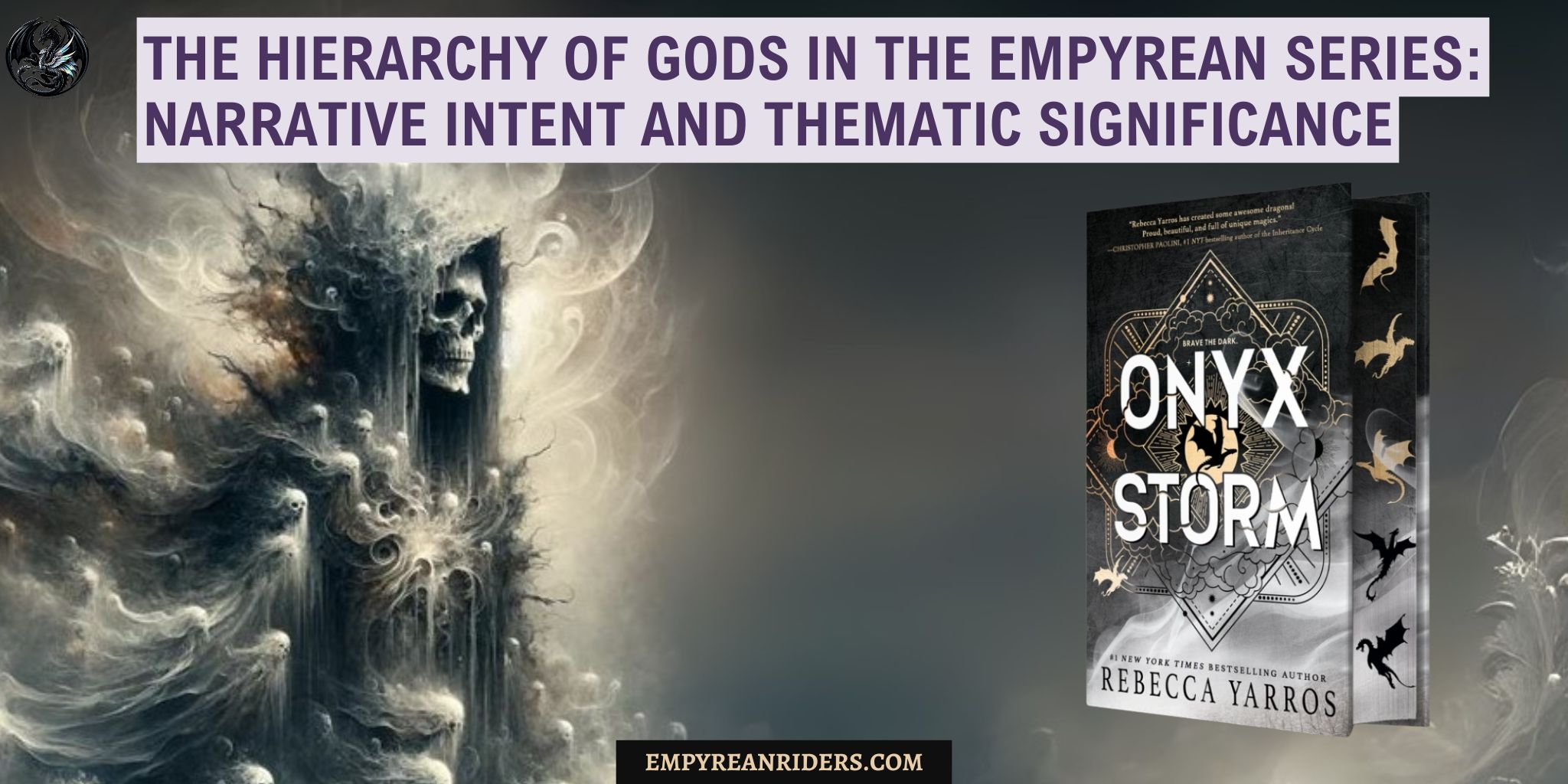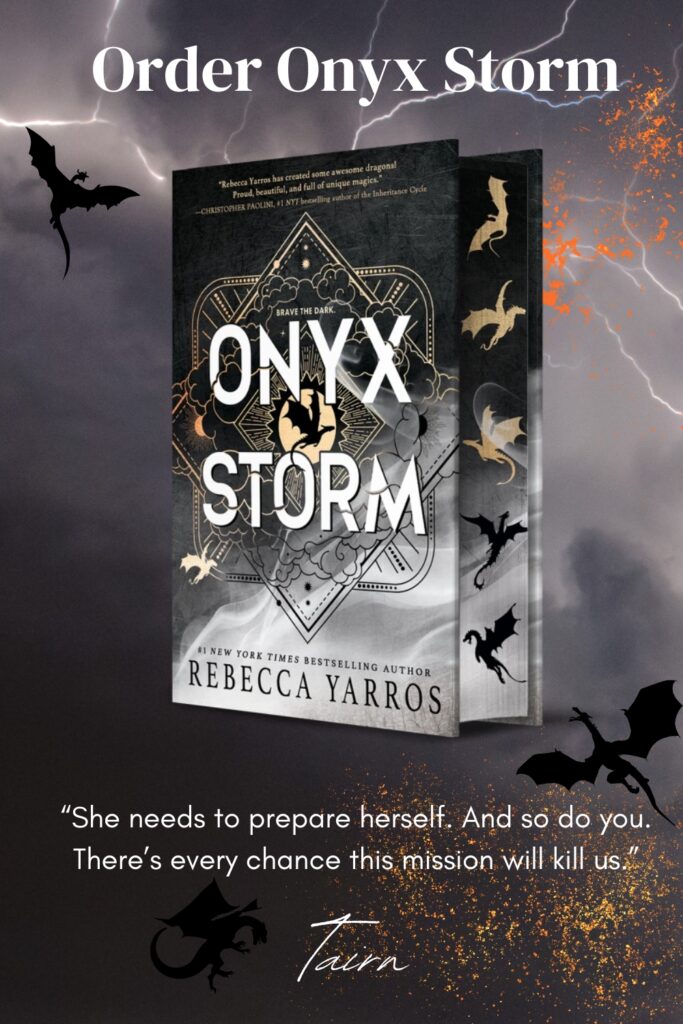The order in which the gods are introduced in the books by Rebecca Yarros appears far from arbitrary. Instead, it subtly establishes a hierarchy of thematic importance and narrative weight that structures the series’ spiritual and philosophical framework.
From the outset of Fourth Wing, Malek, god of death, is the first deity invoked:
“May their souls be commended to Malek.”
This early and persistent invocation signifies the omnipresence of mortality and sacrifice. By naming Malek first, Yarros establishes that death is the ultimate force shaping the cadets’ lives, overshadowing every ambition, friendship, or dream within Basgiath War College. In essence, survival is the fundamental struggle of this world, and Malek embodies that inescapable reality.
Next introduced is Amari, goddess of gods. Her mention coincides with Violet’s first encounter with Rhiannon, whose appearance evokes imagery aligned with Amari’s divine traits. This timing suggests that, while mortality is inevitable, courage, moral grounding, and friendship are vital for meaning within that brief existence. Yet Amari’s placement after Malek implies her divinity is still subordinate to death’s dominion, or at best, parallel to it.
Zihnal, god of luck and fortune, enters the narrative thereafter. His later introduction relative to Malek and Amari emphasizes that chance and unpredictability are relevant only once mortality and morality have been acknowledged. The cadets’ frequent invocations of Zihnal reveal their understanding that skill alone is insufficient; survival at Basgiath depends equally upon fortune’s fickle grace.
In Fourth Wing, we then learn of Dunne, the goddess of war, representing strategic understanding, martial prowess, and the harsh realities of combat. Dunne’s introduction later in the narrative suggests that, while skill and strength are vital, the true nature of warfare—strategy, ruthlessness, and the brutal consequences of conflict—only fully comes into focus as the story deepens and intensifies. What is most important here is that we know for a fact Violet was touched by Dunne, but not dedicated. We also know she was touched by another God. My money’s on Malek. He was introduced first.
Finally, Hedeon, god of wisdom, is introduced last. This delayed revelation suggests that true wisdom is the hardest-earned attribute, only accessible after surviving death’s threat, embracing moral courage, navigating luck, and enduring war’s grim lessons. However, Hedeon’s aura remains questionable. His portrayal hints at deception, suggesting he may not be an equal god but a trickster or usurper—someone who has stolen the domain of wisdom to claim godhood falsely. This aligns with hints of forbidden knowledge and corrupted power surrounding him.
Proposed Hierarchy Based on Introduction and Thematic Weight
- Malek (Death): The ever-present truth of mortality and sacrifice.
- Amari (Goddess of Gods): Moral grounding, courage, and divine leadership.
- Zihnal (Luck): Fate’s chaotic influence over skill and preparation.
- Dunne (War): Strategic understanding, martial ability, and harsh survival.
- Hedeon (Wisdom): True wisdom as the final, hardest-earned power—or false wisdom as a dangerous deceit.
Implications for Violet’s Divine Touches
If Violet is touched by both Dunne and Malek, as many of us theorize, it would narratively cement her as a warrior forged not only in combat but also in the shadows of death itself. This combination grants her:
- Dunne’s strategic and combat acumen necessary for survival.
- Malek’s domain of mortality, explaining her lifelong familiarity with pain, her fragile physical state, and her enduring strength despite it. It positions her as a potential avatar of death, or at minimum, as a bridge between life and Malek’s realm—someone able to withstand what others cannot.
This combination aligns with Rebecca Yarros’s intent to create strong characters who are never too powerful. Violet is not imbued with purely glorious or divine traits; her strengths are tempered with suffering and darkness, making her both powerful and deeply human.
Final Reflection
The gods’ intentional sequencing is a narrative architecture guiding readers through a journey that begins with the acceptance of mortality (Malek), moves through moral courage (Amari), acknowledges fate’s randomness (Zihnal), embraces war’s brutal reality (Dunne), and finally reaches for wisdom (Hedeon)—whether that wisdom is true or dangerously false remains to be seen.
If Hedeon is an imposter god, what implications does that hold for the wisdom Violet seeks in relation to saving Xaden’s soul? Could her potential bond with Malek be the only way to discern true wisdom from corrupted knowledge?





Leave a Reply